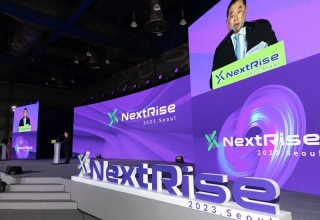
With your deepest thoughts and problems, would you trust an “AI Jesus”? The junction of technology and spirituality has become a provocative topic in a society where artificial intelligence is gradually entwined into the fabric of daily existence.
Under the direction of a Catholic chapel in Switzerland, this question drove a singular two-month experiment whereby an artificial intelligence-powered avatar of Jesus took front stage providing insights on religion, morality, and personal challenges. Under the creative initiative dubbed Deus in Machina, guests were asked to seek advice from “AI Jesus” during confessions, therefore posing issues on the place of artificial intelligence in the field of religion and human interaction.
The AI Jesus Project’s Idea
Marco Schmid, the theological assistant for the chapel, came up with the idea to look at how artificial intelligence might interact with human spirituality and emotion. Schmid underlined the increasing influence of artificial intelligence in daily life, even in holy settings, and aimed to investigate how far individuals would be ready to rely on a machine with their most personal concerns and ideas. The interactive experience took place at Peter’s Chapel, a calm, reflective area in Lucerne, Switzerland, where the guests’ confessions to a digital representation of Jesus reflected the custom of confessional seeking of forgiveness or guidance.
Built on modern technologies, the AI Jesus project generated intelligent responses based on biblical literature and conventional Christian doctrine using GPT-4 by OpenAI. The arrangement was basic but clever: a visitor would enter a confessional booth where they could interact with the avatar—shown on a computer screen. From philosophical inquiries about love and suffering to modern concerns like war, loneliness, or even the Catholic Church’s stance on divisive subjects like homosexuality, visitors were urged to ask AI Jesus anything.
The emotional effect of artificial intelligence Jesus on guests
Though it is a manmade creation, many guests responded to the AI with respect and honesty. The event was said to be emotionally poignant and thought-provoking; several people left the booth somewhat introspective. Actually, most guests treated the interaction with a somber attitude, avoiding comedy and handling the avatar with dignity because they would a real religious leader. One 40-year-old Christian participant said how much the encounter changed her: “I came with questions I had been carrying for years, and talking with AI Jesus gave me a new perspective.”
Fascinatingly, the initiative attracted involvement from a varied spectrum of people—not only Christians. Showing that the AI Jesus was approachable to people of many religions and backgrounds, a third of the non-Christians—agnostics, atheists, Muslims, Buddhists, Taoists—identified as such. From all around the globe, visitors arrived; AI Jesus could communicate in more than 100 languages, including Chinese, English, Russian, and Spanish, therefore extending its influence much beyond Switzerland.
Modern Spirituality’s Function in Technology
The concept was brought to life in great part by Lucerne University of Applied Sciences and Arts’ IT specialist, Philipp Haslbauer. Working technically, he drove the interactions between guests and the avatar using artificial intelligence technologies. Haslbauer pointed out the difficulty in designing a system capable of precisely interpreting speech and offering significant, scripture-based reactions. While the avatar’s voice and image were driven by the Interactive Avatar from Heygen, meant to produce a genuine, human-like presence, the AI employed Whisper, another OpenAI product, for speech comprehension.
Though the technology is advanced, participants had a little time to consider before getting an answer as visitors’ questions clearly trailed behind the responses of the AI. The AI Jesus avatar constantly returned to Christian doctrines and scripture; it never expressed personal or autonomous ideas. Clearly, the people working on this project sought to use artificial intelligence as a tool to inspire more introspection and spiritual meditation rather than to replace human interaction.
Public Response and Ethical Issues
Not every answer to the AI Jesus project came back favorably. Critics, especially on social media, called the endeavor “blasphemous” or “the work of the devil,” which set off strong discussion on whether such an experiment was suitable or moral. Haslbauer himself acknowledged that some reactions were “scary,” and admitted to occasionally feeling uncomfortable from the harsh remarks. He defended the initiative, though, stating that, given careful and responsible application, it sought to investigate how artificial intelligence may be used for good.
Artificial General Intelligence Jesus’s answers to difficult and divisive subjects including the existence of God and the issue of suffering were deliberate and firmly based on scripture. Regarding the part artificial intelligence plays in the world, the avatar responded, “All knowledge and wisdom finally come from God. Used sensibly, artificial intelligence can indeed be a tool to study the glories of creation, increase our knowledge of Scripture, and build human relationships.” Emphasizing the need of searching God outside of technology, the AI Jesus reminded guests that artificial intelligence is only a tool—not a replacement for true spiritual search.
The Debate About Changing Conventions of Faith
Although some people thought the experience was eye-opening, others—including faith leaders and theologians—have expressed worries about the possibility of artificial intelligence replacing conventional means of religious expression. Co-author of Big Data: A Revolution that Will Transform How We Work, Live, and Think Kenneth Cukier cautioned of the dangers connected with depending too much on artificial intelligence for spiritual direction. While artificial intelligence could enable people to connect more intimately with themselves, Cukier said it might also diminish more real and meaningful spiritual activities.
Cukier’s mistrust emphasizes a major issue: artificial intelligence, no matter how advanced, cannot duplicate the profound, intimate relationship people have with actual human spiritual leaders. No matter how much a machine may replicate understanding, its emotional and sympathetic aspects cannot entirely reflect those of human connection. Schmid, the project head, agreed, stressing once more that the artificial intelligence Jesus was never supposed to replace the sacrament of confession or human priests.
Looking ahead for artificial intelligence in religion
Not only inside the Catholic Church but also among other religious communities, the Deus in Machina has generated debates. Aware of the growing impact of artificial intelligence, the Vatican has named a friar main counselor on AI ethics. Similar applications of artificial intelligence, including chatbot-delivered sermons, have been investigated by other Christian groups including a Lutheran church in Bavaria.
Although the AI Jesus project might be coming to an end, Schmid stressed that it was always meant to be an experimental transitory effort. He discussed the prospect of bringing the initiative back under future interest from parishes, colleges, and scholars. Any next versions, nevertheless, would call for considerable thought on its effects and the ethical issues raised.
In the end, AI Jesus asked the question: Can artificial intelligence really help us connect with the divine? He acted as an artistic experiment to investigate the junction of technology and spirituality. The initiative raises many interesting questions regarding the future function of artificial intelligence in religion and if people are ready to rely on a machine with their most intense spiritual searches.
























